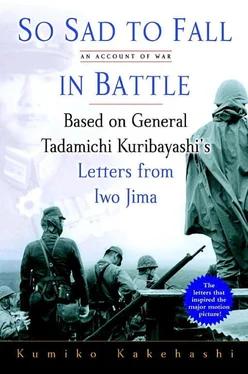She pressed a lace-bordered white handkerchief to the corners of her eyes and continued, her voice a little quieter now.
When you think of it,
It feels so far away:
The sky of home.
Ah, Father! Mother!
Are you both well?
“At sixteen, you’re no more than a child. Just think how badly they must have wanted to go home.”
It was at the end of 2003 that I visited Shindô Takako in her house in Kawaguchi Saitama Prefecture. “Tako-chan,” the little girl who had cried and made such a scene when Kuribayashi set out for Iwo Jima, was now sixty-nine years old.
The whole family agreed that she was “a chip off the old block,” as bighearted and intelligent as her father.
Takako was calm as she talked to me about her memories of her father. Her voice faltered only once, when she started talking about her first visit to Iwo Jima after it had been returned to Japanese sovereignty.
“I think the place was called Mount Tamana. Anyway, when we got there, our guide, who was a survivor of the battle, told us that the young recruits often used to sing together as they marched through this area. ‘Their voices were still the voices of children,’ he said, ‘and when Rear Admiral Ichimaru heard them singing he started to cry.’”
The song they used to sing was “The Sky of Home.”
The youngsters always ended up singing this song even when they had started out singing war songs. It was a soft, sentimental song, and as it was deemed likely to undermine the fighting spirit, you stood every chance of getting a beating if an officer caught you singing it in the army of those days. But Rear Admiral Ichimaru, who happened to be passing by, motioned to an officer who was about to berate them to back off, then closed his eyes and listened.
One of those sunsets unique to the southern islands was splashed across the western sky, and the sound of the boys singing rose upward. Before the fighting started there were moments of beauty even on Iwo Jima—a place nicknamed “Black Death Island” by the battle-hardened marines, some of whom it drove to madness.
The young soldiers went to their deaths, their voices still the voices of children. Takako had been serene and composed when she spoke about the last days of her father and about the letters that begin “To Tako-chan,” but she began to cry when she thought of those young boys. To me it seemed as though the grief of her father had traveled across a span of almost sixty years and was pouring forth through his daughter’s tears.
FOR TAKAKO, HER FATHER was someone who was always kind and fun to be with, though he was often away from home. He was adroit—the sort of person who could turn his hand to anything—and would actively help with things around the house. He stood beside the maid when she was washing the plates and wiped them dry with a dishcloth.
The household had their maid when Kuribayashi was in command of the Second Imperial Guards Home Division. One day, when Sadaoka Nobuyoshi, the civilian employee in the military, visited Kuribayashi’s house around dinnertime, he was astonished to see the maid seated at the table just like a regular member of the family. It was a highly unusual arrangement by the conventions of the time.
According to Takako, Kuribayashi liked to say: “Meals taste better if you all have a good time while you’re eating. It’s not good to sit around all stiff and silent as if you were at a wake.” He often used to tell funny stories that made the whole family laugh.
In a letter from Iwo Jima dated October 10, 1944, he tells Tarô, his son, how he wants him to behave after he is dead: “When you’re at home, always make pleasant conversation with your mother and your younger sisters; make the odd joke from time to time. It’s important to make the whole house cheerful.”
Kuribayashi had a sense of humor, something that was hardly typical of a military man of the time.
In his letters from Iwo Jima, he describes the stream of ants crawling relentlessly toward the soldiers’ quarters as “pilgrims all moving en masse to the Zenkôji Temple.” (Kuribayashi and his wife, Yoshii, were both from Nagano City, where Zenkôji Temple stands.) This particular figure of speech seems to have been a favorite, and appears in several of his letters.
Dumbfounded at the thunderous nightly snoring of his adjutant Fujita, whose bed was right beside his own, he writes, “When looking for a son-in-law, this is clearly the sort of thing one needs to check in advance—or else!” He continues, “Best not mention it to his [Adjutant Fujita’s] father or anybody else, all right?” As his wife read the letter, she must have seen her husband’s mischievous expression in her mind’s eye.
Takako has fond memories of her father becoming “Mister Horsey” for her, and the fun she had riding around on his back.
Kuribayashi had originally been in the cavalry, and his skill as a rider was well-known. The story goes that, during his time at the Army Cavalry School, there was an unbroken horse called Tento. Tento had been universally written off as unrideable, but Kuribayashi, despite being thrown repeatedly, persisted until finally he was the only person able to ride him. This was the same Kuribayashi who would keep scuttling around on all fours until Takako told him that she had had enough and got down off his back. In fact, when I visited Takako’s home, there were a couple of pictures of horses on the walls, one of which showed a military commander on horseback.
Kuribayashi was most worried about Takako among his three children. How would the loss of her father at so early an age affect her? He wrote her on September 20, 1944:
Every morning Granny is kind enough to pray to the gods on behalf of your Daddy. Thanks to Granny’s prayers, Daddy has become cheerful tough. This war is a really big war now, so I really don’t know whether I’ll be able to make it home safely or not.
If I can’t make it back, I’ll be most sorry for you, Tako-chan. But you make sure and do what Mommy tells you, and grow up fast to be a big, strong girl. If you do that, it will make Daddy feel a whole lot better, too.
He mentioned Takako repeatedly in the letters he sent to his wife, as this example shows from a letter dated August 2, 1945:
Recently I had a dream. In it, I went back home where you and Tako-chan were thrilled to see me; but when I said, “I’ve only come back to make my will and I’ll be going right back to the front,” Takako was so miserable. In another one, I went on horseback to a temple. You and Takako had got there before me and were waiting for me. You were very surprised to see me—it was all so vivid in my dream.
In a letter to Yoshii dated August 25, 1944, he wrote:
These days, I am enjoying every day I am alive, one day at a time. I have made up my mind to think of my life as something I have today, but will not have tomorrow. I want so badly for all of you to be able to live long and happy lives. I feel sorriest for Takako because she’s the youngest.
And on December 8, 1945: “I’ve been having lots of dreams lately, and you and Takako often appear in them. You both seem so real. It must be because you’re the ones I’m most worried about.”
“He was thinking about you right up to the end,” I said to Takako. “Yes,” she replied. “He was. And thanks to him I have had a happy life.”
At the time the war ended, Takako had been evacuated to the country, but she soon returned to Tokyo with her mother. Her elder sister, Yôko, passed away immediately after the war due to typhoid fever.
Takako had good grades at school, and her mother, by working as an insurance saleswoman and a dormitory matron, was able to send her to university. Takako was studying French literature at Waseda University when she was selected as the “new face” of Daiei Studios. She told me that she applied not because she was keen to become an actress, but because she wanted to study traditional Japanese dancing and etiquette. Having lost their father, the Kuribayashis did not then have the resources to take extra courses outside school.
Читать дальше












